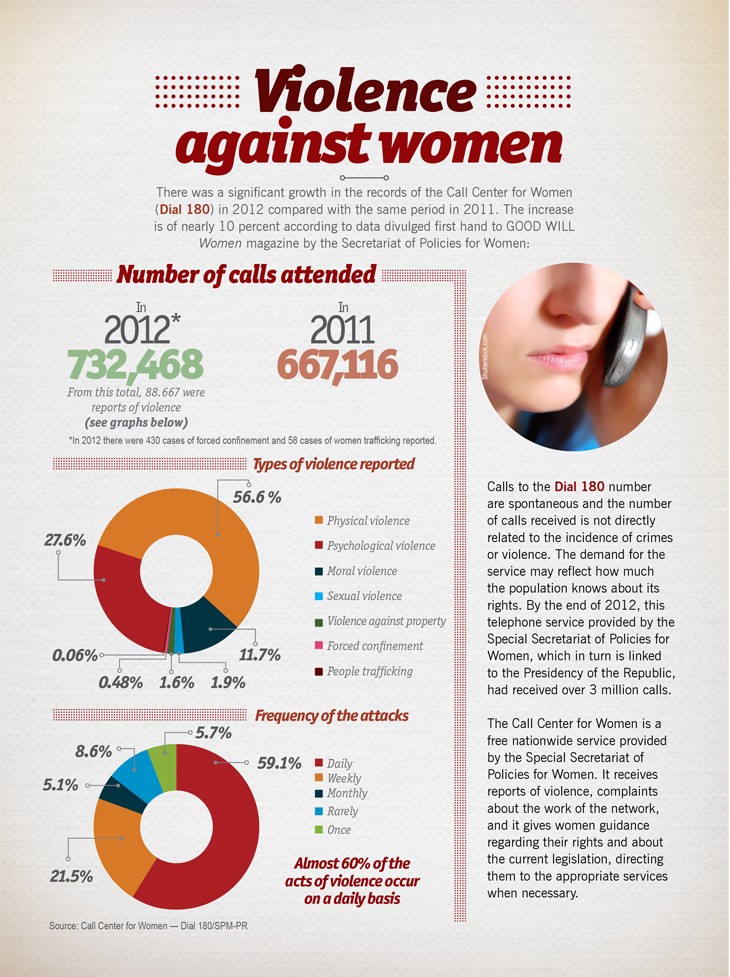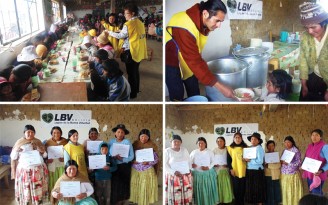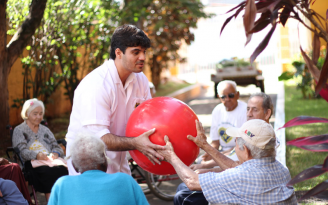
Legislation imposes a new Culture
Brazilian authorities and society work toward improving the Maria da Penha Law, which, since 2006, has been a powerful tool for protecting women from domestic and family violence in Brazil.
By the Editorial Staff
Wednesday | July 30, 2014 | 2:17 PM | Last update: September 22, 2016, 4:07 PM (Brasilia time)

International studies, reports, and statistics show that violence against women is the most widely disseminated form of aggression in the world. Female children, adults, and elderly suffer from this regardless of country, ethnicity, social class, or level of schooling.
According to the United Nations (UN), nearly 70 percent of women in the world have already undergone some form of violence during the course of their lives. The problem is not limited to any particular culture, nation, or social group. The UN states that “the roots of violence against women lie in persistent discrimination against women.” Therefore, to fight this condemnable practice, it is fundamental to strengthen national laws that protect women, in addition to fostering more and more awareness building campaigns as well as social mobilization regarding this issue.
In Brazil, since the Law 11.340 was passed on August 7, 2006, by the then President Luiz Inácio Lula da Silva, it has changed the legal process reality of domestic and family violence crimes in terms of punishing the aggressors. Named the Maria da Penha Law, in honor of the pharmaceutical biochemist Maria da Penha Maia Fernandes, whose life story inspired the new law (read the interview), it creates stricter mechanisms to inhibit and prevent violence against women, besides introducing changes in the Penal Code and in the Criminal Enforcement Law. Thanks to this progress, Brazil witnessed the birth of a legal order that also fulfills the desires of the international society and of commitments that were undertaken through treaties and conventions more than 10 years ago.

“Its content, which was widely discussed and debated in all Brazilian states, in state congresses, in the municipal arena, and among experts, was designed in such a way as to leave no loopholes. Today, when I analyze the aspect of the broad protection network that was added in the text of the law, I see that all the effort was worth it,” recalls Representative Jandira Feghali, who was the reporting member of Congress for this law at the Federal House of Representatives.
According to Feghali, the new law assures that “public authorities will be able to create policies aimed at ensuring the human rights of women within the home and the family bounds, in the sense of protecting them from all forms of negligence, discrimination, exploitation, violence, and oppression.”

The greatest achievement of the Maria da Penha Law, in the opinion of educator Schuma Schumaher, Executive Coordinator of the Human Development Network (REDEH) and co-author of Dicionário Mulheres do Brasil [Women of Brazil Dictionary] and of Mulheres Negras do Brasil [Black Women of Brazil] was “the State assuming its responsibility.”
Map of violence
The data collected by the “Map of Violence 2012: Homicides of Women in Brazil” are shocking. According to this research—coordinated by sociologist Julio Jacobo Waiselfisz with the support of the Brazilian Center for Latin American Studies (CEBELA) and the Latin American School of Social Sciences (FLACSO)—, in Brazil there were more than 90 thousand deaths of women victims of aggression in the last 30 years. Currently, Brazil ranks seventh in this type of crime in a list of 84 nations. The study used information from death certificates and data from the World Health Organization (WHO).
This state of affairs, according to experts, does not invalidate the significant progress achieved in making domestic violence a crime. Nevertheless, everybody agrees that investments must be made increasingly in setting up specialized government bodies, in services to report violence and in sentencing, the ratios of which are still small relative to the number of cases registered.
“It’s frightening! We are experiencing a tragedy in this country in terms of what happens to women, the so-called domestic violence practiced by people with whom women have ties of affection…,” comments educator Schuma Schumaher. According to Schumaher, society ought to be ashamed of this tragedy, of the figures that put Brazil at a dismal level, “so that we may invest in schooling, in our children, so they can start learning the importance of peace in inter-personal relations.”

Gender inequality and violence against women and girls also call for strong social and financial commitment. Senator Lúcia Vânia affirms that this situation “has a face and numbers,” citing data from the Inter-American Development Bank (IDB), from September 2011. “According to the study, one out of every five days of absence at work is caused by the violence experienced by women within their own homes, worldwide. Rape and domestic violence are major causes of incapacity and death during the productive age. A woman that undergoes domestic violence usually earns less than one that doesn’t live in a situation of violence.”
The same IDB report estimated the total cost of domestic violence for the economy of a country: between 1.6% and 2% of the GDP (Gross Domestic Product); in the case of Brazil, something around 160 billion reais.

Consolidation of the law
Judge Ana Cristina Silva Mendes, who is in charge of the 1st District Court Specialized in Domestic and Family Violence against Women of the city of Cuiabá, state of Mato Grosso and member of the Parliamentary Commission of the National Forum of Special Courts for Domestic and Family Violence against Women (FONAVID), considers that the country is undergoing changes and bringing down paradigms: “The law took this problem out of the private sphere (...). That old saying according to which in fights between husband and wife nobody may meddle is not true; now, the government authorities can meddle,” she commented.
According to the judge, the decision of Brazil’s Federal Supreme Court (STF) in February 2012, which gave the Public Prosecution Service the power to accuse aggressors in domestic violence cases, even if the affected woman gives up on pursuing her accusation, strengthens the applicability of the law. According to the original rule, the aggressor could only be sued if the woman filed a formal complaint. “It’s a watershed. The arguments that some of the people who are in charge of applying the law used to uphold have now collapsed. The decision causes the penalties to be applied more strictly. The Supreme Court came along and said: ‘a woman in a vulnerable situation needs to be supported, cared for and, therefore, the State will intervene with a public and unconditional criminal lawsuit’.”
Judge Ana Cristina calls attention to the project to update the Brazilian Penal Code*, which is being discussed in the Senate: “Our greatest concern is that they might bring down this entire process, (...) because our main line of legal thinking for punishment is the Brazilian Penal Code, which contains all crimes. Therefore, if the issue of violence is treated too subjectively, to the point of no longer being typified, we could find ourselves in a tight spot.”
The judge also considers that the structure of the care network foreseen in the law is lacking, indicating, inclusively, that there are elements in the judiciary system that are lacking as well. “We need a larger number of specialized police stations and a better care system. There are some States that are very timid in relation to this issue,” she affirms.
Portal and campaign
The same concern with the subject led the Special Secretariat of Policies for Women (SPM) and the Ministry of Justice to launch, in August 2012, the portal Commitment and Attitude for the Maria da Penha Law. Directed at the people who implement justice, the website brings together a range of data, doctrines, and jurisprudence about this law.

Besides the portal, the campaign Commitment and Attitude for the Maria da Penha Law — The Law is Stronger, also divulged to the public at that time, works towards speeding up rulings, ensuring the correct application of the law, mobilizing society, and fostering the joint action between government and Justice to reduce impunity in the cases of violence against women.
Despite the advances that resulted from the new legislation coming into effect, the challenge is to make agents from the various sectors, the powers that be, and civil society itself to collaborate in an articulated manner. In addition, it is necessary to work strongly towards a change of culture—education being the chief agent for this. In this respect, educator Schuma Schumaher praised the initiative of the Legion of Good Will to work the issue of peace and gender equality in a preventive way (read more about this subject), both inside classrooms and in talks held in the Organization’s Community Centers for Social Assistance. “We are investing as you are in this contribution [to society]. I congratulate the LBV for this commitment! If each person, men and women, could contribute, our children will be grateful in the future.”
___________________________________________
+ Maria da Penha Institue (MPI): founded in 2009, it has the purpose of hindering and preventing domestic and family violence against women—as established in Article 1 of the Law 11.340/06—and redeeming family values back in society. For such, it implements special projects of social protection policies for women, investing in their professional and educational development. More information available at the website www.mariadapenha.org.br.
* To update the Brazilian Penal Code, which dates back to 1940, a commission of 15 jurists prepared the text of the bill that was submitted to the Senate. The material proposes changes connected with cybercrimes, the use of drugs and prostitution, among others. The Code reform has given rise to technical, political, moral, and religious divergence. The bill has already received more than one thousand amendments and has gathered almost seven thousand suggestions from the population.


